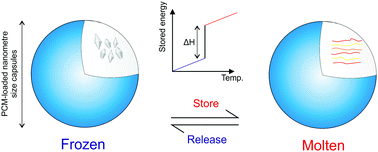当前位置:
X-MOL 学术
›
Chem. Soc. Rev.
›
论文详情
Our official English website, www.x-mol.net, welcomes your feedback! (Note: you will need to create a separate account there.)
Nanoencapsulation of phase change materials for advanced thermal energy storage systems
Chemical Society Reviews ( IF 46.2 ) Pub Date : 2018-04-16 00:00:00 , DOI: 10.1039/c8cs00099a E M Shchukina 1 , M Graham , Z Zheng , D G Shchukin
Chemical Society Reviews ( IF 46.2 ) Pub Date : 2018-04-16 00:00:00 , DOI: 10.1039/c8cs00099a E M Shchukina 1 , M Graham , Z Zheng , D G Shchukin
Affiliation

|
Phase change materials (PCMs) allow the storage of large amounts of latent heat during phase transition. They have the potential to both increase the efficiency of renewable energies such as solar power through storage of excess energy, which can be used at times of peak demand; and to reduce overall energy demand through passive thermal regulation. 198.3 million tons of oil equivalent were used in the EU in 2013 for heating. However, bulk PCMs are not suitable for use without prior encapsulation. Encapsulation in a shell material provides benefits such as protection of the PCM from the external environment and increased specific surface area to improve heat transfer. This review highlights techniques for the encapsulation of both organic and inorganic PCMs, paying particular attention to nanoencapsulation (capsules with sizes <1 μm). We also provide insight on future research, which should focus on (i) the development of multifunctional shell materials to improve lifespan and thermal properties and (ii) advanced mass manufacturing techniques for the economically viable production of PCM capsules, making it possible to utilize waste heat in intelligent passive thermal regulation systems, employing controlled, “on demand” energy release/uptake.
中文翻译:

用于先进热能存储系统的相变材料的纳米封装
相变材料 (PCM) 允许在相变期间存储大量潜热。它们有可能通过储存多余的能源来提高可再生能源(如太阳能)的效率,这些能源可以在需求高峰期使用;并通过被动热调节降低整体能源需求。2013 年,欧盟使用了 1.983 亿吨石油当量用于供暖。然而,块状 PCM 不适合在没有事先封装的情况下使用。封装在外壳材料中提供了一些好处,例如保护 PCM 免受外部环境影响,并增加比表面积以改善热传递。本综述重点介绍了有机和无机 PCM 的封装技术,特别关注纳米封装(尺寸 <1 μm 的胶囊)。
更新日期:2018-04-16
中文翻译:

用于先进热能存储系统的相变材料的纳米封装
相变材料 (PCM) 允许在相变期间存储大量潜热。它们有可能通过储存多余的能源来提高可再生能源(如太阳能)的效率,这些能源可以在需求高峰期使用;并通过被动热调节降低整体能源需求。2013 年,欧盟使用了 1.983 亿吨石油当量用于供暖。然而,块状 PCM 不适合在没有事先封装的情况下使用。封装在外壳材料中提供了一些好处,例如保护 PCM 免受外部环境影响,并增加比表面积以改善热传递。本综述重点介绍了有机和无机 PCM 的封装技术,特别关注纳米封装(尺寸 <1 μm 的胶囊)。



























 京公网安备 11010802027423号
京公网安备 11010802027423号